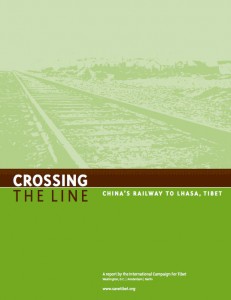 Crossing the Line: China’s Railway to Lhasa, Tibet, a new in-depth report from the International Campaign for Tibet (ICT), finds that the railway China is constructing across the Tibetan Plateau to Lhasa is being built mainly for political reasons and not to benefit the Tibetan people, as the Chinese government consistently claims.
Crossing the Line: China’s Railway to Lhasa, Tibet, a new in-depth report from the International Campaign for Tibet (ICT), finds that the railway China is constructing across the Tibetan Plateau to Lhasa is being built mainly for political reasons and not to benefit the Tibetan people, as the Chinese government consistently claims.
The 70-page study analyzes the economics of transportation, interviews with transportation experts and satellite imagery to demonstrate that the railway’s primary purpose is to serve the Chinese government’s stated goal of increasing political control over Tibet.
The political nature of the railway project was noted explicitly by China’s then-President Jiang Zemin in 2001: “Some people advised me not to go ahead with this project because it is not commercially viable. I said, this is a political decision.”
“This is another example of Communist central planning in Tibet that puts Sino-centric security and development before the interests of the Tibetan people, most of whom will not benefit from a railway under the present conditions,” said John Ackerly, President of ICT.
While broad sections of the Tibetan population continue to live in poverty and die of conditions that could be treated easily with proper health care, the railway’s official price tag is US$3.2 billion.
China began building the 1,118-kilometer (695 mile) track in 2001 and expects it to be operational in 2007. China is the only major country in the world that is significantly expanding its railway network, but the Tibet railway defies economic logic, according to Chinese railway experts.
Competition for funds to build new railway lines in China is intense and the Ministry of Railways employs world-class economists and analysts, who engage in intensive study and debate to determine sound investment. However, despite economic data showing it to be a poor investment, the Tibet railway was mandated by politicians, even according to officials at the Ministry of Railways.
“This railway not only lacks broad support among the Tibetan people, but it also lacks the support of the Chinese Ministry of Railways,” said Ackerly.
Unlike the wide-ranging debate over the Three Gorges dam construction, virtually no debate has been tolerated in Tibet over this project, which dwarfs all other development projects in the TAR put together.
Since China’s invasion of Tibet in 1949, the People’s Liberation Army has been a top importer of goods into Tibet. It will likely become a main beneficiary of the railway, which will drastically lower the costs of feeding and supplying tens of thousands of troops in the TAR.
The other main beneficiaries are likely to be Chinese settlers and migrants, who rely on the subsidized transport of approximately 100,000 tons of wheat and rice into Tibet every year. While Tibetans are relatively self-sufficient, the majority of Chinese rely almost entirely on imported grain and goods.
While some Tibetans support the railway and some sectors of the Tibetan economy may also benefit from it, most Tibetans privately express deep concern over the impact of the railway, particularly the likelihood of a significantly increased influx of Chinese migrants.
“Under different political circumstances, this railway could be beneficial to Tibetans,” said Ackerly.
“But this railway is more akin to a colonial railway built at the expense of the indigenous population.”
“An unequivocal policy statement by Beijing that the population influx of non-Tibetans will be stemmed – and the ensuing implementation of protective measures – would go a long way towards allaying Tibetan fears and distinguishing this railway from other railway projects that marginalize indigenous populations,” said Ackerly.
The International Campaign for Tibet urges the Chinese government to adopt a series of recommendations, including to:
- Design and implement measures to ensure that the railway does not facilitate greater influx of non-Tibetans into Tibet.
- Train Tibetans to take full control of the railway and allow Tibetans to establish freight tariffs and other regulations for passengers, industry, the military, etc.
- Prevent the persecution of Tibetans who voice opposition to the railway.
ICT urges other governments to:
- Avoid involvement in the construction or operation of the railway by prohibiting relevant technical exchanges, denying relevant export licenses etc.
- Establish guidelines to govern their support for economic development activities in Tibet, such as those outlined in the Tibetan Policy Act of 2002 (section 616 of U.S. Public Law 107 – 228), in order to facilitate pro-Tibetan development.
The report was written by ICT staff. Isciences and Earth Satellite Corporation produced the satellite analysis. Several Chinese railway experts, some of whom work directly with the Chinese Ministry of Railways, assisted anonymously.

